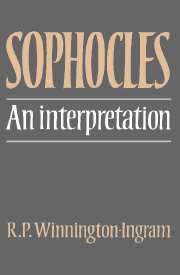Book contents
- Frontmatter
- Contents
- Preface
- Bibliography of short titles
- 1 Introductory
- 2 The mind of Ajax
- 3 The burial of Ajax
- 4 Trachiniae
- 5 Sophocles and the irrational: three odes in Antigone
- 6 Creon and Antigone
- 7 Fate in Sophocles
- 8 The fall of Oedipus
- 9 Furies in Sophocles
- 10 Electra
- 11 Oedipus at Colonus
- 12 Philoctetes
- 13 Heroes and gods
- Appendices
- Select index
5 - Sophocles and the irrational: three odes in Antigone
Published online by Cambridge University Press: 07 December 2009
- Frontmatter
- Contents
- Preface
- Bibliography of short titles
- 1 Introductory
- 2 The mind of Ajax
- 3 The burial of Ajax
- 4 Trachiniae
- 5 Sophocles and the irrational: three odes in Antigone
- 6 Creon and Antigone
- 7 Fate in Sophocles
- 8 The fall of Oedipus
- 9 Furies in Sophocles
- 10 Electra
- 11 Oedipus at Colonus
- 12 Philoctetes
- 13 Heroes and gods
- Appendices
- Select index
Summary
In Trachiniae, at a critical point in the action, Sophocles has placed an ode (497ff.) which celebrates the invincible power of love, or lust. It is prompted by Lichas' revelation (488f.) that Heracles, champion in all else by the might of his hands, has been utterly worsted by his love for Iole. It is also prepared by the words of Deianira, that it is ill fighting against the gods (492), which is what in effect, with a fatal weapon, she will try to do. in the event both she and Heracles are defeated and destroyed, leaving Kypris sole victor on the field. There is a more famous ode upon this subject in another play. If Deianira uses the verb dusmachein, the Chorus of Antigone calls Aphrodite amachos; if the women of Trachis sing that Kypris ever wins the victory, the Theban elders address Eros as unconquered, or unconquerable, in battle.
Aphrodite, or Kypris, as a goddess fit for tragedy we know well from Euripides' Hippolytus; Sophocles' Phaedra which preceded it was a famous play. Curiously enough, however, in general discussions of the divine world of Sophocles and its impact upon his heroes, we read little about this goddess. Consult the indexes of standard works, and you will find few entries under Aphrodite, Kypris, Eros, love, lust, or sex. It may be that this theme did not fit some preconceived notion of what ought to have interested Sophocles.
- Type
- Chapter
- Information
- Sophocles: An Interpretation , pp. 91 - 116Publisher: Cambridge University PressPrint publication year: 1980



